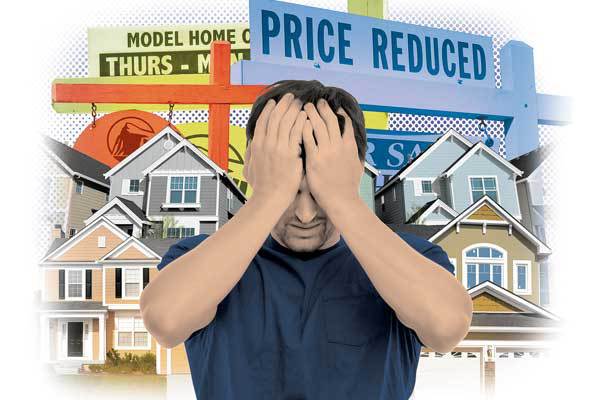|
By Jonathan de Ho Its often I hear this year that everyone is saying property is going slow and going to crash this year in 2016. From our analysis, its not going to crash. Yeah its cooling down, that's for sure but just that. Crash is not something I expect to happen in Real estate in Malaysia. Why so? From my point of view, we may not having a great economy but we are heading to stability. Its all inter-related with other profession as well. Its slowing down, but everyone is taking measures to handle the situation and move towards stability. What do you think? Auction market is having more and more property under auction. More and more unit is unsold or yet rented out. Yet funny statistic shows about half of the investor think that new launches will remain equal with and without launches. Have you heard stories that most of the great company actually appear during the most difficult time of the economy? That's what I believe in, that good time, yes many people is smiling all the way even without investment knowledge. But then what happen when come to bad time? Its about the knowledge you possess and also are you prepare for the bad times? A lot of experience investor already collecting and ready their bullet and pounce on the soft market especially on Urgent Sales. Its about looking to niche and opportunities arise during this period. Have you ready for it? Have you done any preparation for the past year? It's ok if not. There's always time to rise as long as you start action and do something about it. Here I share some of the news that experts also believe in opportunity and turnaround of the market. Most experts rule out the possibility of a property crash BY THEAN LEE CHENG Refer from www.thestar.com.my dated 12th March 2016 AT a property forum recently, a participant asked a panel of five speakers if Malaysia was already looking at a crash in the property sector. “There are fewer launches. More than 60% of loan applications are rejected by the banks and fewer units are being sold today. Are we in a property crash?” he asked during a question-and-answer session at theProperty Market 2016: What to Expect? forum session organised by the Real Estate and Housing Developers Association (Rehda). “Or are we going to keep on saying that maybe at the end of this year, things should bottom out,” said Andaman Property Group managing director Datuk Seri Vincent Tiew, one of the many developers and property consultants who attended the one-day event. The rout in the oil prices and the ringgit started in October last year. Since then, the effects of external and internal factors affecting the economy have started to bite. Developers are feeling the pain. Today’s sales launches are a far cry from the rah-rah years of 2011, 2012 and 2013 when units were snapped up within just a couple of weeks, or days even. Even then, property consultants had questioned the sustainability of that period as house prices escalated phenomenally. In a recent survey for the second half of 2015 conducted by Rehda in 12 states among 159 respondents, more than three quarters of developers expect to have sales of below 50% in the first six months of the launch. While developers bemoan the slow sales, the second half of 2015 fared better than the first half. More than half of the 9,938 units launched were sold in the second half compared to only 40% sold out of the 10,829 units launched in the first half. According to the survey, end-financing and loan rejection topped the reasons for unsold units. Developers also complained that the cost of doing business has gone up. The conclusion was that 70% of the respondents were pessimistic about the first half, with the level of optimism expected to return in the second half of the year. Andaman’s Tiew brought up two issues: Are we already in a crash? Are we going to comfort ourselves that things will be better by the end of this year? At the forum session, moderator Datuk Soam Heng Choon, who is also Rehda deputy president, says there is no crash. “If you look at the Asian Financial Crisis (1997/1998), out of 10, you had five who reneged on their purchases. Prices were down by 30%-40%. Non-performing loans (NPLs) were high. “These are the indications of a crash. We are only going through a lull,” Soam, who is IJM Corp Bhd CEO and managing director, says. Forum speaker Christopher Boyd, Savills executive director, said a crash is marked by a sudden sharp drop in prices and a sharp rise in interest (currently about 4.5%), compared to the double-digit interest rates in 1998. Hamirullah Boorhan, Maybank head of community financial services, says the 1997 crisis was marked by a lot a property auctions and high NPLs. Today, NPLs are less than 2%. Although it is expected to increase gradually to between 2% and 2.5% over the next two years, this increase will likely be manageable. Says Hamirullah: “So, it is not a crash.” Malaysian Institute of Estate Agents’ Erick Y.T. Kho, who is also the CEO of Mapleland Properties, is of the view that while things may not turn around so quickly, there will be opportunities in the second half of the year. “There will always be opportunities in the secondary market. The market is going to bottom out (in the second half),” says Kho. Out of the five forum speakers, four together with forum moderator Soam were of the view that things would be better in the second half, that unsold properties will be absorbed by then and that there was no need to give up on commodities, and oil and gas stocks. Only Khazanah Research Institute managing director Datuk Charon Wardini is of the view that things will continue to go downhill right into 2017. Charon says global economists are of the view that the global economic situation is expected to worsen and Malaysia will be affected by the negative currents. “If anything, it may be going further down,” he laments. Earlier, Charon said there seemed to be a dichotomy in terms of how people view the economy. “People tend to look at the economy from the viewpoint of the gross domestic product. However, a growing economy is about households and their income, and the increase of that income.” He said there are three household expenses, namely, transport, housing and food. The question is, what can be done about the housing cost? House prices should be three to four times the median household income. This is the acceptable threshold, he said. However, it does not mean that every house built must be three to four times the annual median household income, Charon says. But the overall rise in house prices the last several years has exceeded that threshold of three to four times. It is this issue which society is facing today and which must be addressed. Charon says that in the last couple of years, the cost of steel has dropped or has not gone up, likewise with other materials. Soam counters Charon’s argument by saying that salaries in Malaysia have not increased in tandem with the cost of living. To that, Charon says: “We are looking at house prices and household income. It is not an accusation. If we talk about lowering house prices, what is the best way to do it? The best way is to build houses faster and cheaper. One of the ways is by using Industrial Building Systems (IBS). The Chinese developers and the Philippnes are doing it (building faster and cheaper). “If the Philippines can come up with their own system of IBS, why not us?” Charon asks. IBS is a construction technique which modernises and speeds up the building of properties. In terms of quality, it is better than the conventional way of building which Malaysian developers are used to. It also helps to reduce the labour cost and foreign labour, another issue that is challenging Malaysia today, says the Construction Industry Development Board.
2 Comments
Leave a Reply. |
MPIG NewsIn this section we will be sharing on articles & news update related real estate and some other interesting topics. Archives
May 2024
Categories |
- Home
-
New Property Launch
- Lakeside Freehold Fully Residential Private Lifestyle Condominium in Cyberjaya
- Spacious 2024 Completion KL Condo Fully Residential KLCC View
- RUMAWIP Bukit Jalil (Bumi Only)
- Lake City @ KL North NEW PHASE FROM RM380k
- Alora Residences – Inspired living within greenery in Subang Jaya
- PJ Spacious and Affordable 5 Star Condo
- Best Investment 2022 PJ Damansara Low Risk Low Entry Price High ROI
- 2022 PJ Rumah Mampu Milik RM270k Damansara
- Bangsar South 2 Rooms from RM390k BELOW Market Price
- 10% ROI PJ Project near Ikea and One Utama Mall
- Mid Valley Seputeh New Launch
- Pavilion Damansara Heights 柏威年 白沙罗岭 马来西亚 吉隆坡 精选楼盘
- 马来西亚RM300千的PJ屋子-首购族,年轻人月入3千能买房
- 2021 Penang Most Awaited Project
- 2021 New Launch - KL Metropolis
- Freehold LRT Linked 3 Room Suites in Glenmarie
- New SPACIOUS Kepong Landed 6 Room 6 Bath
- Bangsar Last Piece Land New Launch
- Avara Seputeh (Mid Valley)
- Project Announcement Registration. Malaysia New Property Launch
-
Existing & Past Project
- 2020 Lowest Risk & Price in Klang Valley with Great ROI
- Kiara East Suite Dex
- 2019 SAFEST PROFITABLE HIGH CASHBACK INVESTMENT
- Best Property Investment Projects in 2018
- KL City Freehold Spacious Affordable 3 room Project
- Jalan Kuching Freehold New Office & Shoplot
- Jalan Ipoh New Freehold Shoplot & Offices
- RM300k KL Sentral New Prelaunch
- The Olive Condo, Sunsuria City
- Prelaunch Landed House Bukit Rahman Putra
- RM260k No Downpayment Puchong South Suites
- PJ North RM400k High Cash Back Project
- Denai Sutera @ Alam Sutera, Bukit Jalil
- First Phase of Banting New Township
- Neu Suites 3rdNVenue @ Embassy Row by Titijaya & CREC
- COURT 28, Jalan Ipoh KL City New Property Launch Service Apartment. Malaysia New Property Launch
- Semanja Kajang New FREEHOLD Kajang Double Storey Houses. Malaysia New Property Launch
- M Suite @ Desa Park North
- BIJI LIVING @ Sek 17 PJ City by Conlay. Malaysia New Property Launch
- Amani Residence Bandar Puteri Puchong New Freehold Service Apartment. Malaysia New Property Launch
- SFERA RESIDENCY @ Puchong South. Malaysia New Property Launch
- KL North Last Release
- PreLaunch Freehold Double Storey
- LAND
- News & Articles
- Other Reference Link & Services
- Referral
- Career
- MPIG
- Get Professional Advice
- PJ八打灵全新地产项目分析手册
Hours
M-S: 9.30am - 9pm
|
Telephone
+60 12 3760864
|
Email
|


 RSS Feed
RSS Feed